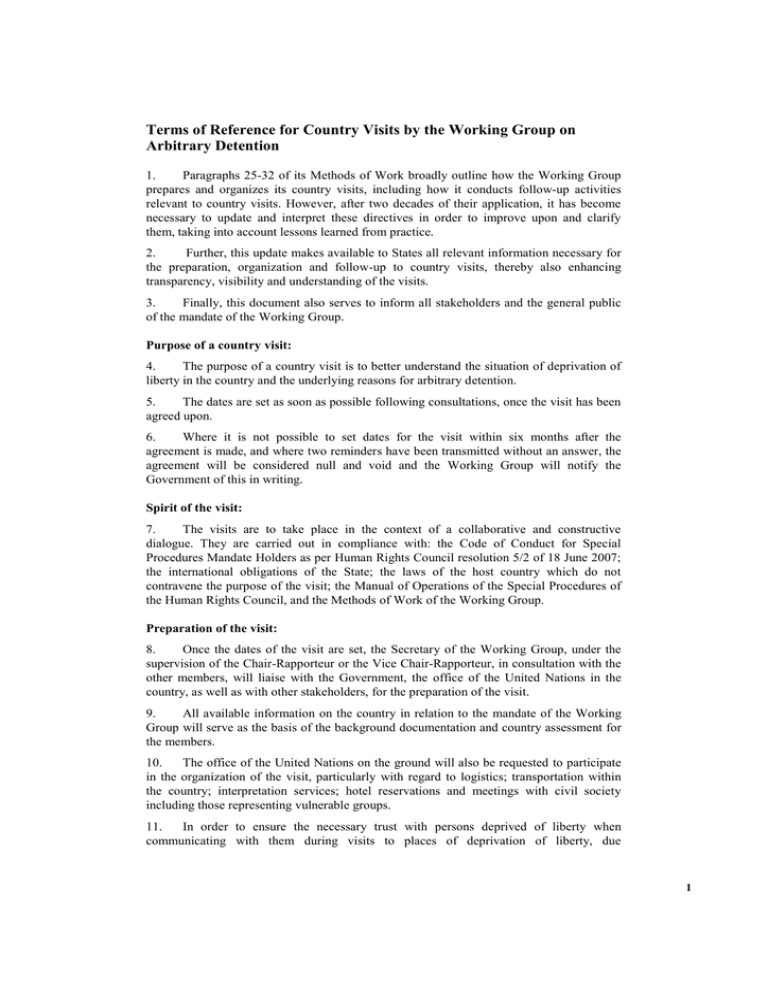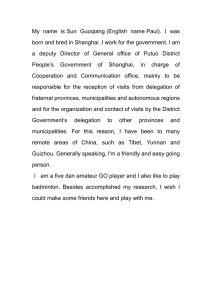Terms of Reference for Country Visits by the Working Group... Arbitrary Detention
advertisement

Terms of Reference for Country Visits by the Working Group on Arbitrary Detention 1. Paragraphs 25-32 of its Methods of Work broadly outline how the Working Group prepares and organizes its country visits, including how it conducts follow-up activities relevant to country visits. However, after two decades of their application, it has become necessary to update and interpret these directives in order to improve upon and clarify them, taking into account lessons learned from practice. 2. Further, this update makes available to States all relevant information necessary for the preparation, organization and follow-up to country visits, thereby also enhancing transparency, visibility and understanding of the visits. 3. Finally, this document also serves to inform all stakeholders and the general public of the mandate of the Working Group. Purpose of a country visit: 4. The purpose of a country visit is to better understand the situation of deprivation of liberty in the country and the underlying reasons for arbitrary detention. 5. The dates are set as soon as possible following consultations, once the visit has been agreed upon. 6. Where it is not possible to set dates for the visit within six months after the agreement is made, and where two reminders have been transmitted without an answer, the agreement will be considered null and void and the Working Group will notify the Government of this in writing. Spirit of the visit: 7. The visits are to take place in the context of a collaborative and constructive dialogue. They are carried out in compliance with: the Code of Conduct for Special Procedures Mandate Holders as per Human Rights Council resolution 5/2 of 18 June 2007; the international obligations of the State; the laws of the host country which do not contravene the purpose of the visit; the Manual of Operations of the Special Procedures of the Human Rights Council, and the Methods of Work of the Working Group. Preparation of the visit: 8. Once the dates of the visit are set, the Secretary of the Working Group, under the supervision of the Chair-Rapporteur or the Vice Chair-Rapporteur, in consultation with the other members, will liaise with the Government, the office of the United Nations in the country, as well as with other stakeholders, for the preparation of the visit. 9. All available information on the country in relation to the mandate of the Working Group will serve as the basis of the background documentation and country assessment for the members. 10. The office of the United Nations on the ground will also be requested to participate in the organization of the visit, particularly with regard to logistics; transportation within the country; interpretation services; hotel reservations and meetings with civil society including those representing vulnerable groups. 11. In order to ensure the necessary trust with persons deprived of liberty when communicating with them during visits to places of deprivation of liberty, due 1 consideration shall be given, to the extent possible, to avoid working with local interpreters or with interpreters who reside in the host country. 12. The visit will include meetings with State authorities, representatives from State institutions of the three State branches, and meetings with representatives from civil society and other relevant non-governmental organizations, as well as visits to places of deprivation of liberty. 13. These meetings and visits should take place both in the capital and other parts of the country as determined by mutual agreement. 14. The Working Group determines that the composition of the delegation must include at least two members, including the Chair-Rapporteur. In exceptional circumstances, if the Chair-Rapporteur is unavailable, he or she will be represented by the Vice Chair.. 15. Members of the Working Group will be accompanied by at least two members of the Secretariat, as well as interpreters when necessary. Meetings with Authorities and Public Institutions: 16. It is preferable that most meetings are held at the beginning of the country visit. 17. This part of the visit is organized mainly by the Government of the host country, based on the proposal by the Working Group, which will meet with all relevant high-level authorities of the three branches of the State. The program is based on mutual agreement, but may be subject to changes. 18. The list of authorities and representatives from State institutions will depend on the political, administrative and judicial systems of each country. In particular, this may include: • the Ministry for Foreign Affairs, • judges of the Constitutional Court, the Supreme Court, the Court of Appeal and First Instance judges and judges of penal execution;• the National Institution for the Promotion and Protection of Human Rights, • the Ombudsman, • the Overseer of places of deprivation of liberty, • Members of Parliament of the Law, Penal reform and Human Rights Committees, • the General Prosecutor and other Prosecutors, • authorities of the Judicial Police, the Border Police and Migration Police, • authorities of the Ministry of Health and of Psychiatric Hospitals. 19. In the course of preparing the visit, a focal point should be appointed by the Government to serve as an interlocutor for the Working Group. The latter may designate a replacement if needed. Meetings with Civil Society representatives and members of Bar Associations: 20. The meetings are organized by the Secretariat of the Working Group, in conjunction with the office of the United Nations on the ground and with the help of various partners. These meetings will be held at a location to be chosen by the Working Group and may include those in the non-exhaustive list of participants below. 21. 2 Participants from civil society may include: • Non-Governmental Organisations (NGOs) that are engaged in any way on the issue of deprivation of liberty, • individuals who have been detained or whose proceedings are pending, • resource persons who, through their skills or experiences, can provide useful information, • politicians, religious leaders, etc. 22. The delegation will also meet with members of the Association of Lawyers (the Bar), public defenders, professors of law and active lawyers, barristers and solicitors. 23. No Government representatives shall be present at these meetings, so as not to hinder the free expression of the participants and to prevent reprisals. Visits to places of deprivation of liberty: 24. Visits to places of deprivation of liberty should begin two or three days after the start of the country visit, to allow members of the Working Group to verify the information they possess and to collect additional information during the various meetings and interviews with prisoners and detainees. 25. Visits to places of deprivation of liberty may take place on any day of the week, including non-working days. 26. Places of deprivation of liberty to be visited in different regions of the country are determined by mutual agreement. The Working Group nonetheless reserves the right to conduct unannounced visits to places of deprivation of liberty not listed in the official program. 27. The Government shall issue official accreditation documents to members of the delegation, in the course of the country visit, allowing them to freely exercise their mandate. 28. Where a presentation before the Working Group is necessary (power point, etc.), it should be kept as brief as possible, to allow members of the Working Group to ask questions directly related to their mandate. 29. Further, in the interests of efficiency, members may be split into two groups during the visit, when feasible. 30. Interviews with persons deprived of liberty must be conducted in private, without witnesses, and in the absence of any guard or administrative staff. Travel within the country: 31. Travel must be organized so as not to disrupt working hours. This may be late in the afternoon or early in the morning. Preparation of the Final Statement at the end of the country visit: 32. The program should allow sufficient time for the delegation to discuss the contents of the statement to be issued at the end of the visit. It should also provide the Secretariat with sufficient time to draft the statement before obtaining approval by the members of the Working Group in the delegation. 3 End of Visit Debriefing: 33. At the end of the country visit, the delegation will hold a debriefing with the Government where the head of the delegation will inform representatives of the Government of its preliminary findings and of the procedure to be followed after the visit. 34. At the debriefing, the Government will formally receive the text of the statement and if it wishes, it could make observations and comments, bearing in mind that at this stage, the delegation is not presenting a report, but only delivering its preliminary findings. Press Conference: 35. After the debriefing, the delegation will hold a press conference at a location of its choice, if possible at United Nations premises, to inform the media, other relevant stakeholders and the general public of its preliminary findings and to respond to questions. 36. A press release, reflecting the main findings, will be released during the press conference. Adoption of the report and presentation: 37. The country visit report will be provisionally adopted by the Working Group in plenary at one of its forthcoming sessions. 38. It will then be transmitted to the Government of the host country for its comments before the final adoption of the report, taking into consideration any observations and comments on factual and legal errors. The Working Group nonetheless retains the right to present its analysis, interpretations and qualifications, as appropriate. 39. Once the report is adopted by the Working Group, it will be presented to the Human Rights Council in conformity with its reporting cycle. This presentation will be followed by an interactive dialogue where the concerned Government will have the opportunity to give its assessment of the work undertaken by the Working Group. Follow-up to recommendations: 40. After the report is presented to the Human Right Council, the Government will be given a period of two years, in accordance with paragraph 32 of the Methods of Work, to inform the Working Group in writing on the status of its implementation of the recommendations contained in the report. It is desirable that this document be drafted in consultation with civil society. 41. Further, in an effort to foster this dialogue, a follow-up visit for a more thorough evaluation of the implementation of the recommendations may also be conducted either at the invitation of the Government or by its acceptance of the request from the Working Group. Adopted at the 69th session (April 2014) 4




